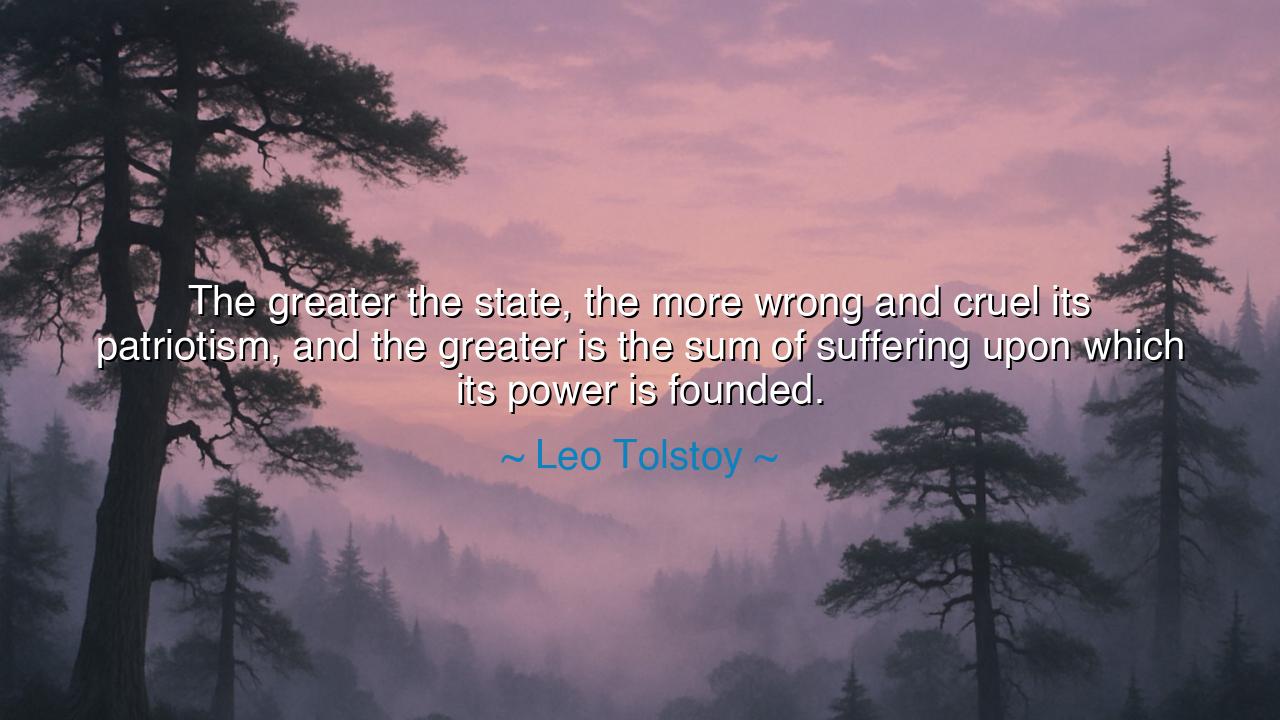
The greater the state, the more wrong and cruel its patriotism
The greater the state, the more wrong and cruel its patriotism, and the greater is the sum of suffering upon which its power is founded.






Leo Tolstoy, that prophet of the Russian soul, once declared with the thunder of moral clarity: “The greater the state, the more wrong and cruel its patriotism, and the greater is the sum of suffering upon which its power is founded.” In this solemn truth, he reveals the dark shadow that follows the glittering crown of empire. For as the state grows vast in power, so too does its need to feed upon the labor, the blood, and the tears of its people. Its patriotism ceases to be love, and becomes coercion—no longer a free devotion, but a demand made with iron.
The origin of this wisdom lies in Tolstoy’s own time, when he beheld Russia’s empire swollen in size, yet bleeding its peasants dry through war and oppression. He had seen soldiers driven to fight in campaigns they did not understand, peasants taxed beyond endurance, and entire peoples crushed beneath the wheels of ambition. To Tolstoy, the patriotism of great states was not the gentle love of homeland, but a cruel mask worn by rulers to justify conquest and domination. The greater the state, the greater the machinery of war, the greater the cries of the oppressed whose lives are sacrificed for banners and thrones.
History affirms his words with sorrowful clarity. Consider the Mongol Empire, vast and mighty, whose patriotism was bound not in love but in conquest. As their dominion spread across continents, their glory was measured not by peace but by the destruction of countless cities, the enslavement of multitudes, the rivers of suffering left in their wake. Or look to Napoleon, who draped himself in the tricolor of France, declaring that he fought for liberty and nation. Yet the more his state expanded, the more Europe bled, until millions lay dead beneath the ruins of his ambition. Here is Tolstoy’s truth: that the greatness of such states is built not on freedom, but on suffering.
Even in Tolstoy’s own Russia, the Tsars proclaimed their patriotism loudly, demanding loyalty from all their subjects. Yet this love of state often meant sending poor peasants to die in foreign wars, silencing dissent with exile, and demanding sacrifices from those who had nothing left to give. The larger the empire grew, the more distant it became from the lives of its people. The state’s greatness was purchased with their misery, and its patriotism was enforced through cruelty.
But Tolstoy’s words are not merely condemnation; they are a warning to future generations. He teaches us to be wary of the call to blind patriotism, especially when it serves the ambitions of the powerful rather than the well-being of the people. He reminds us that love of country should never mean worship of the state, for when the state becomes an idol, it demands sacrifice upon sacrifice, until its foundation is soaked with the suffering of those it claims to serve.
The lesson is plain: true patriotism is not measured by the greatness of the state, but by the justice of its deeds and the well-being of its people. If patriotism demands cruelty, conquest, or the silencing of truth, it is false. If it demands endless suffering to uphold the glory of rulers, it is hollow. Real patriotism, like real love, must protect, must uplift, must cherish—not destroy.
Therefore, let us guard ourselves against the seduction of vast power. Do not measure your nation’s greatness by the reach of its armies or the weight of its wealth, but by the happiness of its people, by the freedom of its citizens, and by the peace it brings to the world. Resist the call to hatred disguised as love of country. Stand instead for the kind of patriotism that seeks justice, compassion, and truth.
So let Tolstoy’s words endure as a living fire in our minds: the greater the state, the more wrong and cruel its false patriotism—but the greater the people’s wisdom, the purer and gentler their true devotion can be. Seek that devotion, practice that love, and pass it to your children, that their loyalty may never be twisted into cruelty, but may shine as a beacon of peace for all generations.






AAdministratorAdministrator
Welcome, honored guests. Please leave a comment, we will respond soon